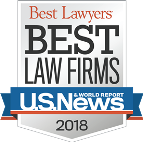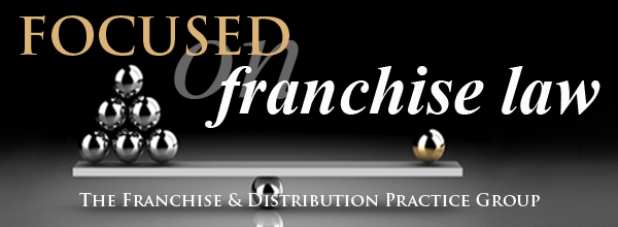Freshii Not Joint Employer; 7-Eleven to Disclose Metadata

bkurtz@lewitthackman.com
dgurnick@lewitthackman.com
tgrinblat@lewitthackman.com
swolf@lewitthackman.com
msoroky@lewitthackman.com
kwallman@lewitthackman.com
tvernon@lewitthackman.com
May 2015
David Gurnick Presents to ABA
David Gurnick, Certified Specialist in Franchise and Distribution Law, business litigation attorney and author, was invited by the American Bar Association to co-present a seminar for members attending the 38th Annual Forum on Franchising in New Orleans. The seminar topic is entitled Finders Keepers Losers Weepers: Opportunities, Risks and Considerations in Using Intellectual Property Created by Others. The event takes place in October.
Tal Grinblat published in Business Law News Annual Review
Tal Grinblat co-authored an article highlighting recent case law regarding franchising and legislation passed affecting both franchisors and franchisees in California. The article appeared in the State Bar of California’s Business Law News, which publishes an update every spring. Click: Selected Developments in Franchise Law to read the article.
Are You Ready?
Upcoming state and federal laws go into effect soon. Click the links for more information:
- JUL 1, 2015: California’s Paid Sick Leave Law
- DEC 1, 2015: FDA’s Nutrition Labeling of Menu Items
FRANCHISOR 101: Freshii Not Joint Employer

 The National Labor Relations Board (“NLRB”) recently published a memo finding that Canadian fast-casual restaurant franchisor Freshii is not a joint employer of its franchisee’s employees. The ruling concerns unfair labor claims made by an employee against a Chicago franchisee.
The National Labor Relations Board (“NLRB”) recently published a memo finding that Canadian fast-casual restaurant franchisor Freshii is not a joint employer of its franchisee’s employees. The ruling concerns unfair labor claims made by an employee against a Chicago franchisee.
The ruling is important in light of another initiative at the NLRB, claiming McDonald’s Corporation is a joint employer of franchisees’ employees at many McDonald’s locations.
In the Freshii case, a franchise owner fired employees who tried to organize a union. A regional NLRB branch requested advice from NLRB’s general counsel whether to treat the franchisor as a joint employer, rendering the franchisor potentially responsible with the franchisee if the firings were found unlawful.
Under Freshii’s franchise agreement, system standards do not include personnel policies or procedures. Even if Freshii shared policies with franchisees, each franchisee decided if it wished to use the policies in its own restaurant. The franchisees were solely responsible for setting wages, raises and benefits for employees. Freshii provided its franchisees with a sample employee handbook, but did not require the franchisees to use it. Potential candidates could apply for jobs with franchisees through the franchisor’s website, but Freshii did not screen resumes or do anything more than forward them to its franchisees. Franchisees made their own hiring decisions. Freshii only passively monitored sales and costs, and the franchisor and any software it provided were not involved in scheduling workers.
In a key finding, NLRB’s General Counsel noted Freshii stayed silent after the franchisee sought advice on how to resolve the union issue. After the union started to organize at the franchisee’s restaurant, the franchise owner informed Freshii’s development agent, but neither the franchisor nor the development agent advised the franchisee on how to respond.
Under the NLRB’s current standard, joint employer status over franchisees’ employees may exist if a franchisor “meaningfully affects matters relating to the employment relationship such as hiring, firing, discipline, supervision and direction.” Freshii was found not to have a meaningful impact over the franchisee’s hiring, compensation, scheduling, discipline, or ongoing supervision.
A broader standard proposed in several cases against McDonald’s indicates the NLRB may look at “totality of the circumstances,” including how the separate entities structure their commercial relationship, to decide if a franchisor influences working conditions of a franchisee’s employees to the extent that collective bargaining cannot occur without the franchisor’s involvement.
This so-called “industrial realities” test does not distinguish between direct, indirect, or potential control over franchisees’ working conditions. Its broader scope would make more companies joint employers. In the Freshii case, the NLRB Memo said that even under the broader standard, there was no “joint employer: “Freshii does not directly or indirectly control or otherwise restrict the employees’ core terms and conditions of employment.” Therefore “meaningful collective bargaining could occur in Freshii’s absence.”
The NLRB’s Freshii memo is good news for franchisors and provides guidance on steps franchisors can take to reduce the risk of being deemed a “joint employer” whether for matters concerning labor practices, or other vicarious liability matters.
To read the entire NLRB memo, click: Advice Memorandum re Nutritionality, Inc. d/b/a Freshii.
FRANCHISEE 101: 7-Eleven Ordered to Disclose Metadata

A federal court has ordered 7-Eleven to disclose its metadata in three franchisees’ claims that they were targeted for termination for financial, political and racially discriminatory reasons. Metadata is deep down “data about data” in computer files. It is created when documents are created, collected and processed to be produced in discovery.
The franchisees sought metadata of documents 7-Eleven filed in litigation, including dates of creation, authors, custodians, dates of each modification, author of each modification, and data showing who documents were electronically sent to. The Court found the franchisees showed that many paper documents exchanged in discovery were missing source, date, and other key background. The Court rejected 7-Eleven’s claim of hardship or undue expense to produce the metadata.
Read the Opinion and Order: Younes v. 7-Eleven, Inc. (D.N.J. 2015) 2015 WL 1268313.
